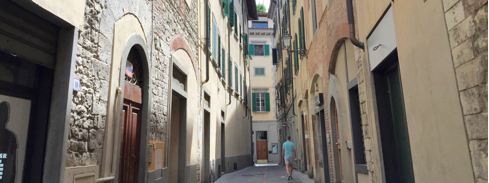June 12-13, 2017, Prato / Monash seminar on Transasia as Method. In this conference, Yiu Fai Chow and I present a part on the notion of trans in transasia.
Our abstract:
A transnational approach as proposed in this conference holds the potential to think beyond the confines of the nation-state, an aim that resonates with the general zeal of the inter-Asia cultural studies movement. But what does this trans signify? In what way is it (not) different from the inter? What boundaries does it ask us to cross, and which boundaries are rendered less significant, or assumed crossed? In our paper, we will first re-enter the notions of trans and inter, pointing at the danger of parochialism (privileging Asia as a unique site of research and thus replacing a national exceptionalism by an equally problematic regional exceptionalism) as well as the danger of methodological nationalism that continues to haunt a transnational approach – the borders that are performed in this term are predominantly national borders. We thus propose to push the notion of trans beyond the confines of the nation-state. We draw on two of our ethnographic research projects: female migrants in China entering the city of Shanghai; and Hong Kong creative workers relocated to Beijing and Shanghai. They provide a case in point for our argument that the transnational can also be located within the boundaries of the nation-state.
The seminar:
Monash Asia Institute, Monash University will host an international conference, ‘Trans-Asia as method’ at Monash University Prato Centre in Italy on 12 and 13 June 2017.
The conference aims to discuss the potential of trans-Asian perspectives and approaches for the investigation of human mobilities, media culture flows and people’s cross-border connection across Asia. With the intensifying globalization processes, intra-regional and transnational approaches to the study of Asian culture and society have been developed in the last decade as shown by initiatives such as the Inter-Asia Cultural Studies society and journal, InterAsian Connections (by the Social Science Research Council), and TRaNS: Trans-Regional and -National Studies of Southeast Asia, to name just a few. Monash Asia Institute has also been engaging with trans-Asian approaches to promote intellectual dialogue beyond country, region and discipline. More specifically, drawing on the idea of “Asia as method” that was suggested by Takeuchi Yoshimi—which Kuan-Hsing Chen expands in association with the development of inter-Asia cultural studies—, Monash Asia Institute has been engaging with “trans-Asia as method” to encourage the analysis of transnational connections engendered by human mobilities, media culture flows and people’s solidarity across the Asian region, as well as intra-regional comparison and reciprocal learning about how globally shared issues are commonly and differently articulated in various Asian countries and cities. The purpose of this conference is to further advance such “trans-Asian” approaches, and rigorously flesh out their definition, through extensive discussion of how they generate innovative knowledge production, what kinds of scholarly frameworks need to be developed, and how transnational collaboration can be fruitfully formed.
Examining empirical cases regarding human mobilities, media culture flows and people’s connection across Asia, “Trans-Asia as method” will explore four patterns of trans-Asian approaches, which are not mutually exclusive to each other, as follows:
1 Cross-border flows and connections
Much has been studied about of trans-Asian flows and connections in terms of human mobilities, migration, media culture and social activism. The conference will discuss how we can further advance such studies and what has been hitherto neglected issues of investigation. How to define the scope of “trans-Asia” in an open and inclusive manner will also be discussed.
2 Inter-Asian comparison and referencing
While the examination of cultural and social issues in a particular socio-historical context is crucial, giving fresh insight from other Asian experiences enriches our understanding. The conference will discuss how we can tactically develop inter-Asian comparison and referencing to further deepen our understanding of the issues and engender innovative conceptualization and theorization from Asian experiences.
3 Transnational & de-nationalized approaches
In a globalized world, so many issues have been shared among Asian countries (and beyond). The conference will explore transnational and de-nationalized perspectives through which we can better understand and engage with globally shared issues, which are commonly and differently articulated in a particular place. We will also consider the lessons, relevance and implications of Asian experiences to other parts of the world and vice versa.
4 Cross-border collaboration
The investigations above will cultivate the sense of shared-ness among researchers working on similar issues in different places and foster transnational collaboration to tackle these shared issues. The conference will discuss some ways to further promote transnational collaboration beyond the confinement of the nation-state and region as well as beyond academic community.
Confirmed speakers include: Ien Ang (Western Sydney University), Jeroen de Kloet (University of Amsterdam), John Erni and Chow Yiu Fai (Hong Kong Baptist University).
You can find more details of the conference and the venue at the Monash Asia Institute website: http://artsonline.monash.edu.au/mai/
